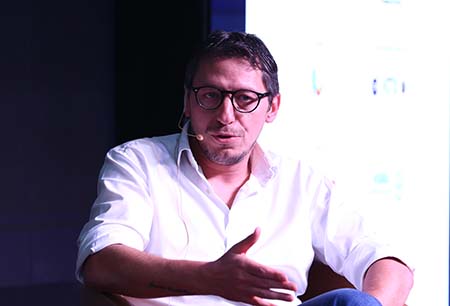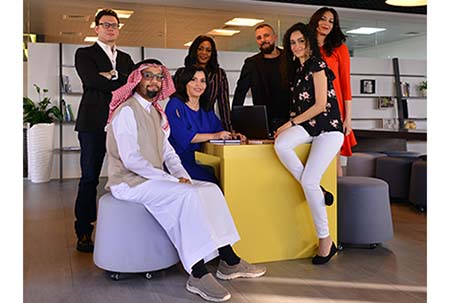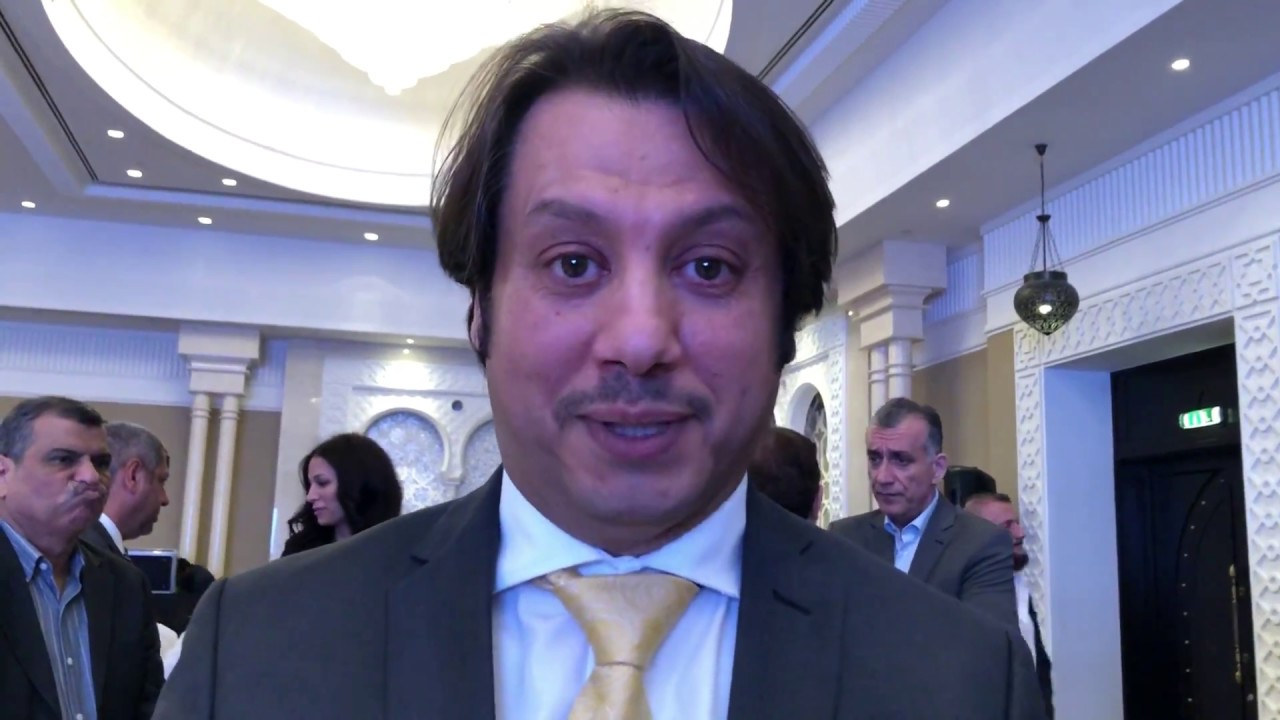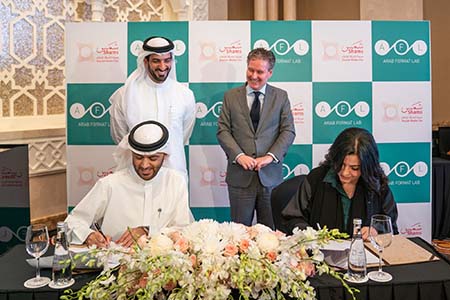Theres never been greater demand for quality Arabic content, but are the content specialists the production houses, distributors, commissioning editors and content producers able to fuel that demand, and are we able to create work that can appeal to international audiences? This was the crux of the debate at the keynote panel discussion […]
 Theres never been greater demand for quality Arabic content, but are the content specialists the production houses, distributors, commissioning editors and content producers able to fuel that demand, and are we able to create work that can appeal to international audiences? This was the crux of the debate at the keynote panel discussion moderated by Lina Matta, Channel Director, MBC 2, MBC 4, Max & MBC+ Variety, MBC Group, at the ASBU BroadcastPro Summit on November 13 in Dubai.
Theres never been greater demand for quality Arabic content, but are the content specialists the production houses, distributors, commissioning editors and content producers able to fuel that demand, and are we able to create work that can appeal to international audiences? This was the crux of the debate at the keynote panel discussion moderated by Lina Matta, Channel Director, MBC 2, MBC 4, Max & MBC+ Variety, MBC Group, at the ASBU BroadcastPro Summit on November 13 in Dubai.
Joining the panel, titled Content Creation: Creating an Export Market for Arabic Content, were experts representing key aspects of the content business: Sadek Sabbah, Chairman of Cedars Art Production; Khulud Abu Homos, CEO of Arab Format Lab; Mai El Khalifa, Senior Commissioning Editor, Content Dubai TV and Dubai One at DMI; and Gianluca Chakra, Managing Partner at Front Row Filmed Entertainment.
Matta set the stage by pointing out some of the major changes that hit the MENA media market in 2018, some the direct result of political upheavals in the region, which were as responsible for the opening up of the Saudi media market as they were for wiping out Turkish drama from our regional screens. The forced exit of Turkish drama, the mainstay of many Arabic drama channels, compelled content experts and broadcast networks to look inwards for fresh local content and beyond Turkey for other storylines.
Lina Matta began the panel discussion by asking the panellists how they were affected by the exit of Turkish drama from regional screens and the lessons learnt from this experience.
There should be no shame in buying formats and doing remakes because this … serves as the training ground for people to eventually use that expertise to conceptualise and create their own formats and lift the production level of writers Lina Matta, Channel Director, MBC Group
Mai El Khalifa said the exit was good for us because it helped us not to rely on one territory We were the last to exit the Turkish scene, but it has made us more robust and agile in actually looking to other territories like Latin America.

Sadek Sabbah said Turkish dramas and telenovelas from Latin America influenced the launch of pan-Arab drama series of 60 episodes in the Arab world. Cedars Art Production has been producing two long series each year. These series are scripted by a team of talented writers specialised in writing long-form content, he commented.
Khulud Abu Homos seconded that. Turkish drama has actually influenced the way we look at the format of drama that we produced. Turkish drama started a trend as far as script and long-form drama went.
She added that the US and Turkish dramas finally got them out of the 30-episode format and forced us to think more creatively about long-form drama series.
Turkish drama set the benchmark for us as far as the format of how we produce drama went. Secondly, there is a lot to learn from how Turkish drama went international by doing remakes of international dramas. They took the rights for the remakes of Revenge, for instance. The whole experience of trying to go international and using Hollywood expertise to create a different level of Turkish drama is a success story and a positive lesson for us on how to create that initial demand.
This led the panel to explore the next big topic in the market today the Saudi experience and how Saudi Arabias investment in entertainment will change the milieu. Chakra stepped in at this point to say that while a country can invest in entertainment, content and studios, building a media industry is a more organic task that money cannot buy.
You cant really buy the know-how. You have to start from zero. If they want to invest in anything, it must be in developing their writers and mentoring them. We have always lacked good writers here and this is why the Turkish series were so successful here. We could relate to their culture and they literally had no competition from the Middle East, mainly because most of the products that were produced locally were far too local either it was too Lebanese or too Egyptian. By comparison, Turkish series had a pan-Arab appeal.

He pointed out that one way to possibly avoid the heavy localisation of content and create something that can travel may be through experimenting with co-productions.
The only cinema that can apply to other regions is Egypt. The rest is quite scattered. Content produced in the UAE does not necessarily do well in Kuwait or Lebanon, and vice versa. You have the example of a Nadine Labaki film which was a massive hit in Lebanon but didnt do well here. So in Saudi Arabia, perhaps the best way to do it is through co-productions with Egypt, where you gradually integrate Saudi talent and Saudi writers.
El Khalifa pointed out that investment also plays a big role in creating successful content that can travel.
If you go back to Turkish drama, just last year the Ministry of Culture invested $40m in Turkish series unlike our region, where we are not supported in a kind of a nucleus way. We need investment in good stories, which is what Khulud and Sabbah are doing, and then we need good distribution companies to package those stories for travel. If that doesnt happen, it will stay in the region.
We dont lack talent in this region. What we lack is confidence of the investors and confidence in our talent Khulud Abu Homos, CEO, Arab Format Lab
Matta took this opportunity to explore some of the writing initiatives that both Sabbah and Abu Homos have started in different parts of the region. Sabbah, who has two programmes covering theatre titled Masrah Masr (Egypt Theatre) and Masrah Al Saudiya (Saudi Theatre), explained that initiatives to create content for Saudi audiences have been positive but are presently taking a lot more time and effort.
Through Masrah Al Saudiya, Cedars Art Production has created a platform that has helped identify new talent in Saudi Arabia through running casting calls across the country, explained Sabbah.
Through Masrah Al Saudiya, we have been able to attract a lot of new talent from Saudi Arabia in terms of actors, writers, creatives and so on. They have good stories to tell and very creative writers but presently, they lack the scriptwriting technique. So we are getting our experts from Egypt and Lebanon to come in and help polish those scripts and train these young talents in various elements of running a production. We believe that through training, we can encourage new talent and professionals to join the media sector. As a result, we are investing a lot more time on Saudi productions. But this is because it is the beginning. We have seen huge improvements since we first started a year ago, and hopefully by the beginning of January, we will have our first work aired on MBC. And this will give us a good opportunity to have this young talent from Saudi Arabia not just in drama but in cinemas as well.
Abu Homos commented that they have taken to writers rooms to encourage original content in Saudi Arabia.
We dont lack talent in this region. What we lack is confidence of the investors and confidence in our talent. I have seen brilliant writers who will never make it through the doors of MBC or Dubai TV because they dont know where or whom to approach. But if we bring a BBC writer to Jeddah to train them to create a strong script, we will instil that confidence in them to create their own scripts. KSA has the talent. The most watched shorts on YouTube come from KSA. The stories need to come from the actual society, and I think investing in writers rooms is the way forward to achieve that.
Taking her cue from Abu Homos, Matta asked El Khalifa if young and untested talent would be accepted by Dubai TV if they brought scripts to her.
With OTT, we are now looking at 15 episodes or less instead of stretching it to 30 or 60 feature-length pieces Sadek Sabbah, Chairman, Cedars Art Production
There is a lot of talent out there, but when they come to broadcasters, they dont get accepted because they are untested and dont have big names attached to them. If somebody comes to you with a show like that, what would you as a broadcaster do? What is your appetite for taking risks with new talent? she asked.

El Khalifa admitted that although they didnt take too many risks because it is a tough market for broadcasters, they are more likely to take risks with new talent and pick them if we know they are backed by professionals and writers rooms who have overseen their work and will carry them through the whole project.
Abu Homos pointed out that the best way to do this is to invest in pilots.
The discussion then moved to OTT and how the launch of streaming services has potentially overturned the dynamics of content production. Matta asked whether it had created new opportunities for fresh talent or merely destroyed the market.
The panellists seemed positive about the arrival of OTT players, and clearly it has changed the dynamics of the media marketplace, whether it is working with new talent, censorship or even revisiting programme formats and number of episodes.
Chakra called the way TV works here quite outdated but declared that will have to change with Netflix, Amazon and more international networks entering this market with original productions.
The new generation of content consumers want more than the formulaic Ramadan shows. They will expect content that is of the Game of Thrones or House of Cards standards because they are now exposed to that, and with the current writers you cant really get that, so you really have to start from zero and start grooming our local writers.
Here, a lot of writers and producers limit themselves on the kind of content they can write about, while foreign networks dont care about censorship. They are opening a whole new market that didnt really exist. Before, you always had the same writers and the same faces. These guys are going to break those boundaries and a new market is going to open up. As a distributor, we see huge demand for new products and we started acquiring remake rights to feed that demand; we have started to identify new writers and have started to groom them.
You cant really buy the know-how. You have to start from zero. If they want to invest in anything, it must be in developing their writers and mentoring them Gianluca Chakra, Managing Partner, Front Row Filmed Entertainment
Matta pointed out that there should be no shame in buying formats and doing remakes, because this often serves as the training ground for people to eventually use that expertise to conceptualise and create their own formats and lift the production level of writers.
The panellists agreed that OTT has created an appetite for edgier content that can also appeal to international audiences.
Sabbah said he welcomed digital players because they move fast with their decision-making and allow for more experimentation and the audience also has a different taste.
80% of the GCC audience is below the age of 40. With OTT, we are now looking at 15 episodes or less instead of stretching it to 30 or 60 feature-length pieces. These new episodes have a different rhythm, condensed action with a cliffhanger. This new experiment will pave the way for shorter series with bigger productions. In fact, we are just about to conclude shooting the first season of Dollar in this format.

Abu Homos quickly pointed out that long-form content must not be dismissed, as it is still required for daytime content.
I think long-form during daytime is still important. Short-form is fine when it is for premium prime-time, but we should be thinking of the needs of the channel as well. Each of the Turkish episodes were literally like a feature and 90 minutes long, but they worked. Daytime is very important, but it requires the long-form format because it also attracts advertising.
She also added that one of the key criteria for the success of any drama in the Middle East is its appeal to the female audience.
The local content developed so far within the OTT space seems to be skewed towards a male audience.
The team then returned to the crux of the discussion how to create content that can potentially travel.
Sabbah pointed out that his company already creates a lot of work that is shown to a global audience, especially through Netflix, Shahid and iflix, among others.
Our Lebanese series Al Hayba, for instance, is on Netflix and is subtitled in more than 40 languages and doing extremely well in different markets including the Dominican Islands. Before, countries could only view content if they were from Hollywood and similar big studios. Now, platforms like Netflix are not just bringing international content to our markets, they are also taking our content to international audiences and people love it.
Abu Homos pointed out that Arab Format Lab has done this through its Arabic adaptations of international formats and, more recently, by co-producing a series with an Italian production house.
This is where we need to think and act in confidence. Our culture is so rich. Even our political facts are attractive to others.
Sabbah added that some genres do better than others globally.
We were the last to exit the Turkish scene but it has made us more … agile in actually looking to other territories like Latin America Mai El Khalifa, Senior Commissioning Editor, DMI
We have realised that our comedies dont travel as well as other genres because our sense of humour and reflections are very different. But horror, suspense and love tend to do better. Al Hayba again is a good example of a story that has travelled successfully.
Khulud cited Bilal from Barajoun as an example of a film that was successful globally.
It was distributed in 17 countries and that is a sign of success for a locally produced movie.

Chakra disagreed, stating that Bilal was indeed difficult to distribute and Front Row had tried to help on this front.
We tried to help by introducing Barajoun to foreign sales companies but they all reacted in the same way saying it was too dark and too local, and couldnt be targeted at families or kids. If the film had been co-produced and international sales agents and producers involved in the production from the beginning, they would have pointed this out and changed the script a bit to fit both and give it a target audience.
Wadjda, by comparison, made several million dollars in the US and France, although it didnt do as well locally, he said.
Creating stories that travel is difficult given the content limitations and the cultural differences, the panellists agreed, but not impossible.
The panel concluded with Chakra pointing out that Netflix and Amazon intended to focus their energies on the Middle East next year, with heavy investment planned for original productions. The panellists agreed that OTT will dictate some of the content dynamics in the coming years.













































































